
Introduction
The Nissan FJ20 engine series
is highly revered in Japan among car entheusiasts and gained notoriety
during the 1980's in Australian, New Zealand and throughout the world of
motorsport with the Gibson Motorsport FJ20ET DR30 Skyline Group A Touring
cars, S12 FJ20E (Gazelle) Silvia,
.and the FJ24 BS110 Nissan
240RS Group B World Rally Cars.
The FJ20 was Nissans
flagship performance production engine in the 1980's and was developed
and born in the famous "OGIKUBO" factory in TOKYO. With technologically
advanced features like the world's first sequential fuel injection,
double overhead cams, 4 valves per cylinder, double chain valve driving
and bullet proof internals, the FJ20 was Nissan's Golden Child. |
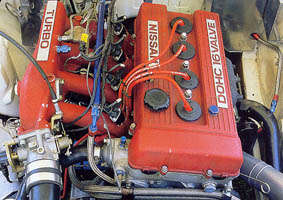
-Gibson Motorsports FJ20ET
DR30 Skyline Engine Bay.
|
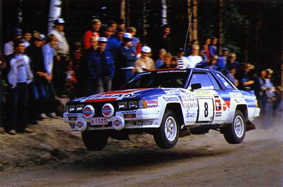
-The FJ24 powered Nissan
240RS Group B World Rally Car.
|
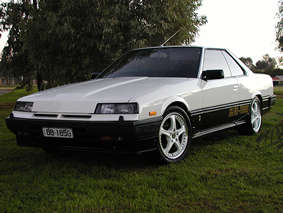
-Pauls DR30 Skyline
|
Nissan created the FJ20 engine to adapt it on the 5th Generation GC210
SKYLINE( 1977-1981).
Two different grades of
the GC210 Nissan SKYLINE was sold in Japan.
The "GT" version came powered
by the L20 straight-six engine and was the most popular Sports/Grand Tourer
in JAPAN at the time in the late 1970's.
The other version sold was
"TI" (Touring International). This grade had a shorter wheel-base than
the GT. And had a reputation as an excellent handler. But the engine was
lacklustre 1800cc SOHC Naturally Aspirated 4-cylinder.
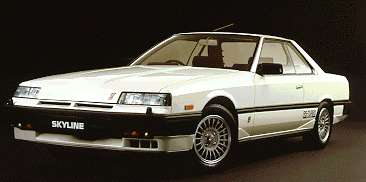
-DR30 Nissan Skyline |
NISSAN's original plan was
to upgrade the GC210 Skyline "TI" to high performance specs by fitting
the newly developed 150ps FJ20E 2.0L DOHC 16 valve 4 cylinder engine.
But Nissan decided to wait
until they developed the 6th generation R30 series Skyline's to utilise
the high performance FJ20 engine exclusively.
In October of 1981 the FJ20E
powered DR30 Skyline RS2000 hit the Japanese domestic market and was an
instant automotive success. And Hi-po 190ps FJ20ET Turbocharged DR30's
soon followed in 1983.
The DR30 was also
to use Nissans "ATTESA E-TS"(electoronic 4-wheel torque distributing system)
But in NISSAN the development was very slow , so the "ATTESA E-TS" system
wasn't ready in time for the DR30 Skyline.
But years later "ATTESA
E-TS" appeared in 1989 ,adopting it to the famous (Godzilla) Skyline R32
GT-R & GTS-4.

-Above: George Fury's
Gibson Motorsports DR30
-Right: S12 Silvia (Gazelle)
Rally Car |
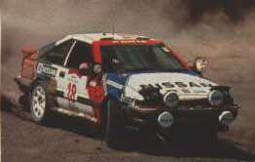 |
|
Nissan
then felt that it would not be cost effective to fit the FJ20 engine only
to Skyline models.
So they had to modify the
FJ20E and FJ20ET to fit in the engine bays of S110 Silvias and S12 Silvias(also
known as Gazelle's).
Engine Bay room in the Silvia
was initially a problem. The basic compornents and mechanism were kept
the same, but in the S110/S12 Silvia/Gazelle the shape of intake/exhaust
manifold was made different. So FJ20E/FJ20ET S110/S12 Silvia/Gazelle's
had slightly less power and torque than the FJ20 engines fitted in the
DR30 SKYLINE's due to the inclusion of their restrictive new manifold.
Mr. Shin-ichiro Sakurai ,
known as "The father of
the SKYLINE" recalled that...
"We made the FJ20
for only the DR30 SKYLINE. But NISSAN couldn't permit to put the engine
on only SKYLINE , the reason why it was very high cost. Then , we couldn't
help using FJ20 to S110/S12. But the space of engine-room is different
DR30 and S110/S12. So , we re-make intake/exhaust manifold for S110/S12.
It's not original shape. These manifold can't get the power & torque
of the DR30's FJ20" |
FJ20E & FJ20ET (Turbo)
engine swaps have gained popularity, not without good reason. The factory
power output claim of the Nissan FJ20 turbo of around 200Hp is still impressive
today and many of the Group A Touring cars were putting out well
over 400+ Horsepower from the 2-litre Nissan turbocharged engine using
early '80s technology.
Today FJ20's can be found
in numerous auto entheusiasts cars throughout the world. Everything from
modified Datsun 1600's(510's), Holden Gemini's, Datsun Roadsters and Toyota
Corolla's to 500+ HP Austin Sprite Drag cars.
Nissan FJ20 is a performance
benchmark in Japanese automotive history and one of Japan's greatest high
performace production engines.
|





